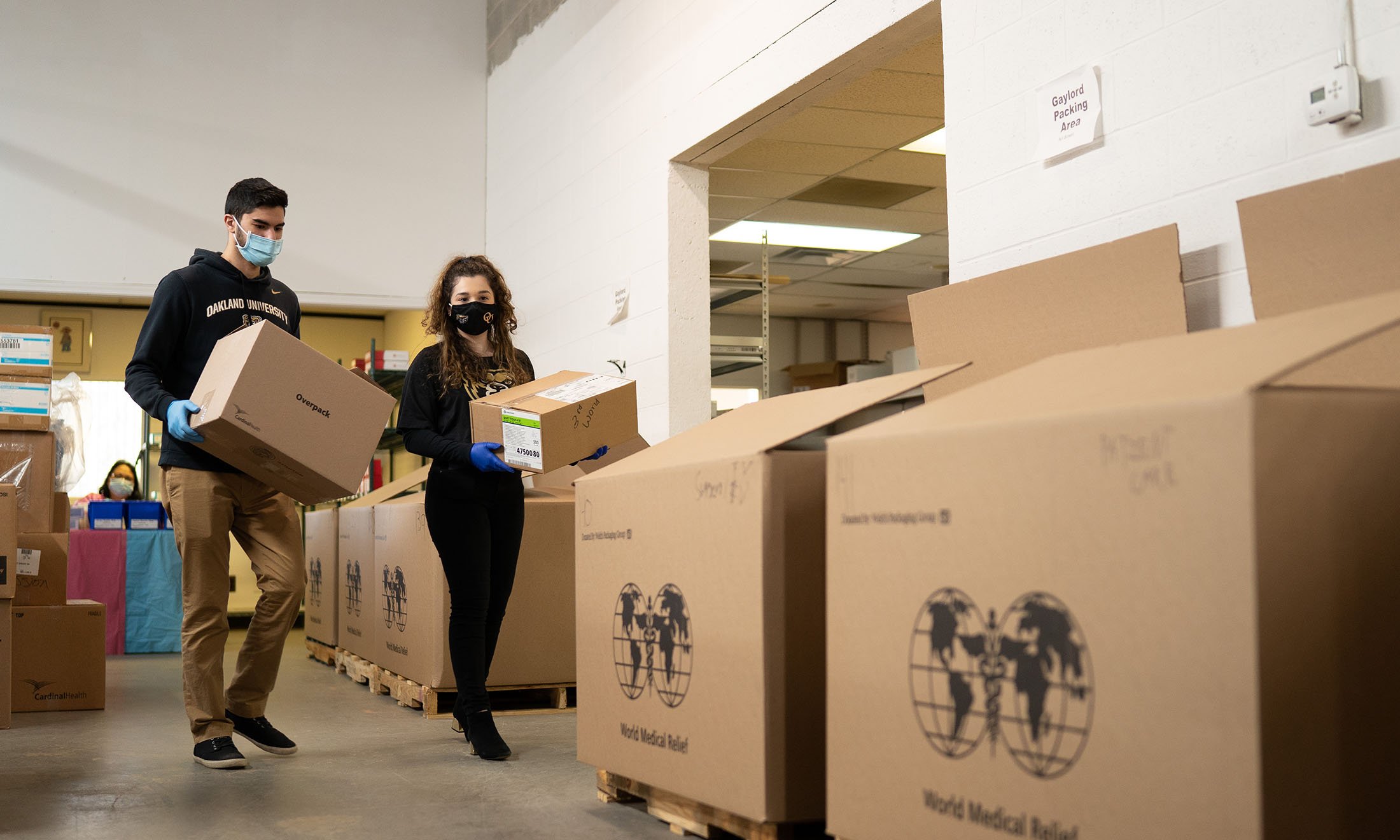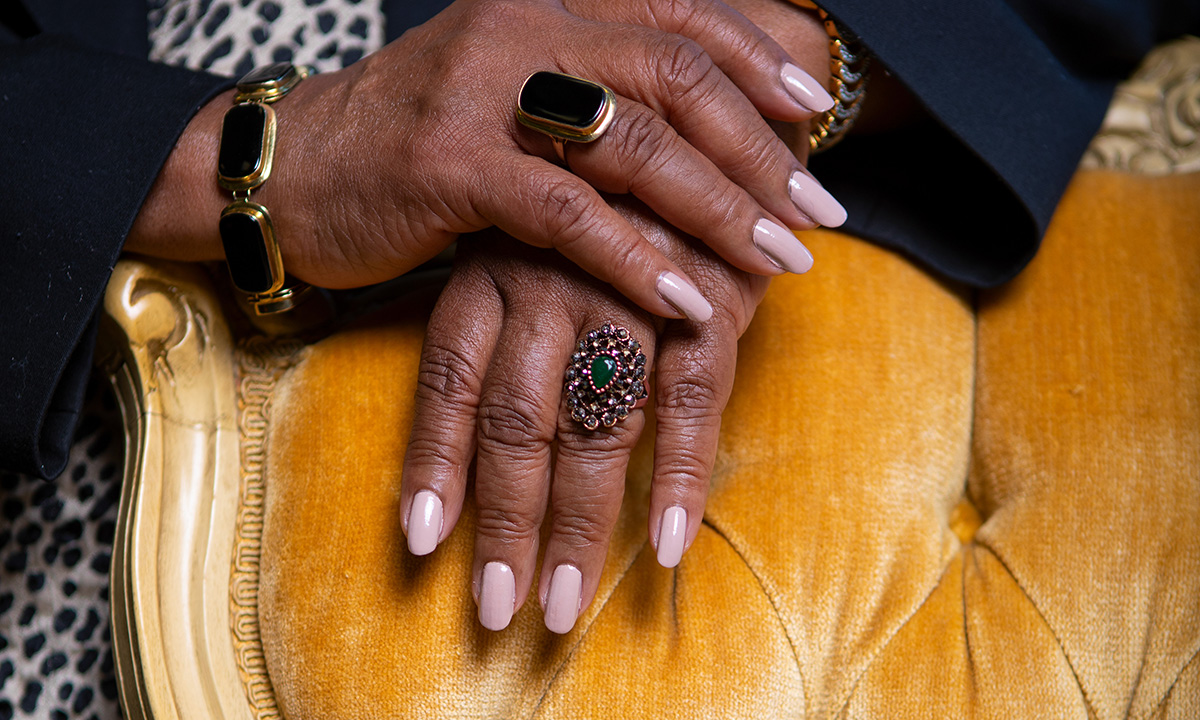- YouTube
- TikTok
Contributing to the Public Good
Transforming the world through service

University student group OU United 2 Health volunteer at World Medical Relief, Inc. every Saturday. Here, OU United 2 Health president Mark Karmash and vice president Doria Morante pack up boxes of medical supplies. Photo by Robert Hall
Oakland University makes community engagement a priority. So much so, that it has been written into the university strategic plan that Oakland University will strive to “become a leader in serving the needs and aspirations of our communities and region through expanded community relationships, institutional reputation and visibility, and engagement.”
“Since first coming to Oakland University in the ‘90s, I’ve seen it’s approach to community engagement become more structured and aligned with grassroots community organizations, as well as business, civic, and elected officials,” says Senior Vice President for Student Affairs and Chief Diversity Officer Glenn McIntosh. “Additionally, there is greater involvement of faculty and students engaged in service learning and volunteer initiatives.”
OU’s founders, Alfred and Matilda Dodge Wilson, were champions of philanthropic endeavors. Matilda dedicated much of her time and energy to serve the community through a number of charitable organizations, including the Women’s Society and the Women’s Auxiliary. This passion spilled over into the foundation of Oakland University, and has been a key component in the institution’s goals.
In its early years, OU devoted resources to providing continuing education to the surrounding community. Particularly successful was the Continuum Center, a department within the Division of Continuing Education that offered counseling services to women in southeast Michigan, helping them find a more creative and satisfying place in the contemporary home and community. As stated in Oakland University Annual Report for 1965–66: “The launching of the Continuum Center and the expansion of the Alumni Education project, both made possible through generous grants by the Kellogg Foundation, introduced new dimensions into the program. These phases of the division’s total offering also gained national interest and attention as members of the staff were invited to make presentations before audiences across the country.” |
Additionally, the University initiated a number of other community-based programming, including Community School Programs, nurturing partnerships with 23 local schools; Oakland Forums, assembling local leaders to work on community problems; and Cultural Enrichment Programs, providing performances easily accessible to community members.
Since then, Oakland has increasingly expanded its outreach. Today, OU works with more than 375 organizations throughout Oakland, Wayne, Macomb and other Michigan counties. From OU Cares programs for teachers, individuals and families helping those on the autism spectrum, to the OU-Pontiac Initiative partnering to advance Pontiac while creating learning opportunities for students, OU is making a lasting impact.
“We work arm-in-arm with our neighbors in Pontiac to build a collaborative effort that will enhance the educational experience of our students; provide wonderful opportunities for faculty research, teaching and service; and enhance the educational experience of our students while also enhancing the quality of life of residents of the Pontiac community,” says Kevin Corcoran, Ph.D., chief community engagement officer and dean of the College of Arts and Sciences. “It is a true point of pride that we have built a strong relationship based on mutual respect.”
The university also reaches beyond Michigan to connect students to research and study away programs throughout the United States, as well as study abroad opportunities throughout the world. Additionally, OU offers services to international students, scholars and their dependents from more than 60 countries. With global partnerships, OU works in collaboration with universities and institutions to advance education, scholarship and creative activity for students and faculty.
Even today, the university is continuing to evolve its role in surrounding cities. This is most evident with the COVID-19 pandemic when OU answered a call-to-action to provide novel support in a number of ways. These efforts included working with state, county and local agencies to donate and deliver food; connecting the OU community with campus experts through social media; offering tutoring, daycare and mental health support; and providing housing for health care workers; to name a few.
As times continue to change, so do the needs of the community. And Oakland University will continue to be there, working together, offering resources and relief to the community and beyond. “Universities do not simply ‘train’ individuals for jobs or careers, we prepare students for life, for work in their communities, for making contributions to their communities, for full participation as informed citizens,” says Dr. Corcoran. “We exist as institutions to contribute to the public good, and we use our talents and expertise in service of that public good to serve our community.”
Read more about Oakland University's community collaborations in this issue of the OU Magazine.


 May 17, 2021
May 17, 2021 By Kelli Warshefski
By Kelli Warshefski

